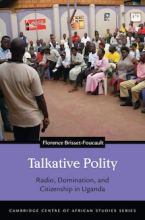Florence Brisset-Foucault, Ohio University Press, 2019, 344 p.
For the first decade of the twenty-first century, every weekend, people throughout Uganda converged to participate in ebimeeza, open debates that invited common citizens to share their views. These debates, also called « People’s Parliaments, » were broadcast live on private radio stations until the government banned them in 2009.
Talkative Polity contributes to the methodological debate on the social embeddedness of political control. Based on ethnographic research, the book aims at underlining the social thickness and the political ambivalence of the negotiations at play when it comes to defining how to talk about politics in restrictive contexts. The study shows that the relative stabilization of rules on how to talk about politics does not simply reflect a great confrontation between authoritarian forces on the one hand, and liberal forces on the other. It also involves autonomous social ambitions, and ideas of good polity, along with intimate and collective aspirations of morality and order whose plural historicities need to be reconstructed.
Far from being simply a univocal upsurge of « free speech », « popular participation » or ethnic politics, the People’s Parliaments tell a history of local capitalism and its intertwinement with the State, of the political economy of international aid, of the professional aspirations of journalists, and of the heritages of colonial education. They reflect the ambitions of a particular class of under-employed young men, the mutations of political mobilisation under the Movement regime and the social transformations of Buganda’s ethnic patriotism.
The book shows how the ebimeeza were not only banned because they were harboring speech that was directly criticizing the regime’s anti-liberal tendencies or because they allowed a renewal of Buganda’s radical politics, but also because they challenged established representations about who is entitled to talk about « politics », and who is not. As such, the study of the People’s Parliaments and of the heated controversies they triggered brings to light old and profound concerns on the forms and the basis of citizenship in Uganda.
Talkative Polity documents a short-lived but highly original sphere of political expression in a context of high political constraint, aiming to do justice to the richness of Uganda’s complex political and radio culture, as well as to the story of ambitious young men who didn’t want to behave as the State expected them to. It advocates for an ethnographic and sociological approach of phenomena of deliberation and participation away from normative yardsticks in order to unearth the particular conceptions of citizenship and of the good, ordered polity they harbor and nourish.
Florence Brisset-Foucault is a lecturer in political science at the University of Paris 1 Panthéon-Sorbonne and a member of the Institut des mondes africains in Paris. Previously, she was a junior research fellow at Trinity College, a member of the Centre of African Studies, and a research associate at the Centre of Governance and Human Rights at the University of Cambridge.
CONTENTS :
List of Illustrations xi
Acknowledgments xiii
Introduction
1
CHAPTER 1
The Ebimeeza and the Political Culture of Kampala’s Upper Class
21
CHAPTER 2
The Political Economy of Radio Speech
45
CHAPTER 3
The Ebimeeza and the Partisanization of Ugandan Politics
66
CHAPTER 4
The Ebimeeza as a Ganda Patriotic Stage
88
CHAPTER 5
“A Constituency in Itself ” : Talk Radio and the Redefinition of Political Leadership
111
CHAPTER 6
Taming Speech : The State’s Suitable Citizens
136
CHAPTER 7
The Bureaucratization of the Ebimeeza and the Desire for Discipline
162
CHAPTER 8
An Academic Model of Exclusive Citizenship
191
CHAPTER 9
Silent Voices, Professional Orators, and Shattered Dreams
216
Conclusion
243
Notes
251
Bibliography
301
Index
319







